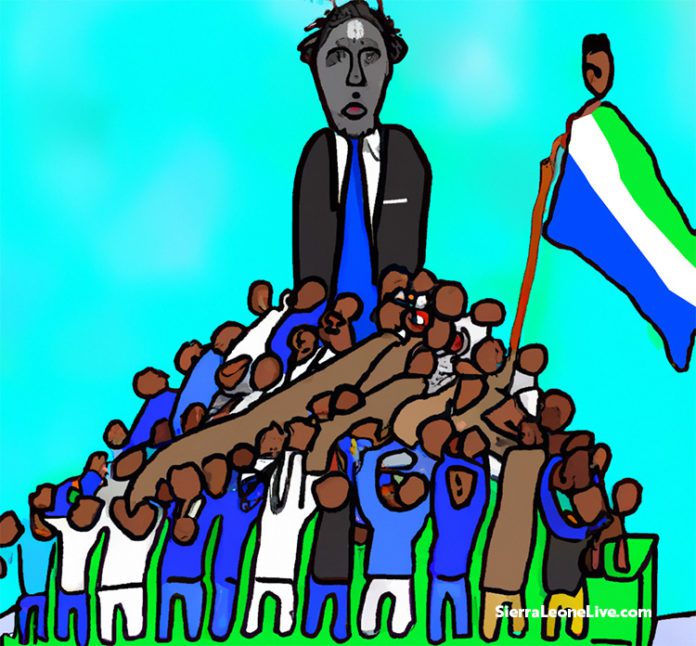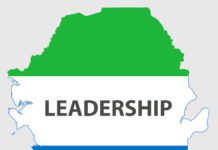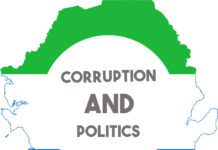

Politics has always been an important part of human societies. Politicians have made campaign promises to get votes and keep their jobs. Politicians are known to have a high level of political worship among grassroots people. Political worship can take many forms, including loyalty, support, admiration, and even devotion to a specific politician.
The question then becomes, “Why do ordinary citizens worship politicians?” The answer to this question is based on the need for political representation and leadership, the desire for change and growth, and the fact that politicians are a source of income for many people.
This report will look at why grassroots people worship politicians, using Sierra Leone as an example. It will also look at dictators’ roles as politicians, the significance of controlling the flow of funds, and stealing from the poor to give to the rich. The report also talks about how foreign aid can help corrupt politicians stay in power, as well as the political and economic effects of aid. Last, the report looks at how President Julius Maada Bio and former President Ernest Bai Koroma led Sierra Leone.
Leadership and Political Representation
The need for political representation and leadership is one reason grassroots people worship politicians. Politicians are often seen as the voice of the people, and they are expected to look out for their constituents’ best interests. This is especially important for marginalized and disadvantaged groups, which may not have a voice in the political process. In Sierra Leone, for example, most people live in rural areas, and they often feel like the political elite in Freetown, the country’s capital, don’t care about them. As a result, they frequently rely on local politicians for representation and leadership.
The Desire for Change and Development
The desire for change and development is another reason grassroots people worship politicians. Corruption, nepotism, and incompetence plague the political systems of many developing countries. As a result, there has been little development and a high level of poverty, particularly in rural areas, where many people look to politicians for change and advancement. People often think of politicians who promise to bring about change and development as messiahs.
In Sierra Leone, for example, President Julius Maada Bio was elected on a platform of change and development. He is popular with the people on the ground, in part because he promised to raise the standard of living in the country.
Reliance on Politicians as a Source of Livelihood
Finally, grassroots people worship politicians because they rely on them for a living. Because the government is often the largest employer in many developing countries, many people rely on government jobs for a living. As a result, politicians have a significant impact on the lives of their constituents. Politicians who are seen as helping their constituents often get their loyalty and political worship. In Sierra Leone, for example, politicians often use their power to get government jobs and contracts for their supporters. This makes the people feel like they owe them something.
The Political Role of Dictators
Dictators are rulers who use brute force to maintain control over their subjects. They maintain power through intimidation and violence, control the media, and silence dissent. Despite the negative consequences of dictatorship, some people continue to idolize dictators. This is because dictators often promise stability and security at the cost of freedom and democracy.
People thought that Sierra Leone’s former President Siaka Stevens was a dictator who was liked by the people. From 1967 to 1985, he ruled the country with an iron fist. He was well-known for his “one-party state” policy, which effectively ended democracy in the country. He also had full control over the media, and people who didn’t agree with him were often killed or put in jail. Even though he ruled by force, many people on the ground saw him as a powerful leader who kept things stable.
Controlling the Flow of Funds
Politicians need to control the flow of funds because it gives them power and influence. Politicians with control over the flow of funds can decide who gets what, giving them an advantage over others. They can reward their supporters while punishing their opponents, ensuring their power.
Politicians are known to control the flow of funds in Sierra Leone. For example, when Ebola broke out in 2014, the government was given money to help fight the disease. Later, though, it was discovered that politicians had stolen some of the money. This shows that politicians can wield considerable power by controlling the flow of funds.
Giving to the Rich while stealing from the Poor
Stealing from the poor and giving to the rich is a prerequisite for becoming a top politician. This is because politicians need money to stay in power and hold on to their influence. They often use public money to make money for themselves by giving contracts to friends and family and getting richer at the expense of the poor.
Both former President Ernest Bai Koroma and current President Maada Bio have been accused of taking money from the government. This shows how politicians in Sierra Leone frequently use public funds for personal gain.
Foreign Aid’s Role in Enabling Bad Political Leaders
Foreign aid is critical for many developing countries, but it can be a two-edged sword. On the one hand, aid can help reduce poverty, encourage growth, and help people in crisis. Aid can also help corrupt politicians stay in power by giving them a steady flow of money that they can use for their own benefit.
Foreign aid has been criticized in Sierra Leone for enabling bad political leaders. Politicians have used aid to enrich themselves at the expense of the poor. As a result, there is a lack of accountability and transparency in the allocation of aid funds.
Aid’s Political and Economic Implications
Aid can have significant political and economic consequences. On the political front, aid can undermine democracy by bolstering corrupt political leaders. Aid can also foster a dependency culture in which the government relies on aid rather than developing its own revenue sources.
Aid has the potential to distort markets and stifle economic growth. Aid can be used, for example, to subsidize local industries, making it difficult for other industries to compete. As a result, there may be a lack of diversification and long-term economic growth.
Sierra Leone’s recent presidents
During his presidency, they accused Ernest Bai Koroma of poor leadership. He was accused of stealing public funds, undermining democracy, and silencing opposition voices. His administration was chastised for being authoritarian and corrupt.
President Julius Maada Bio, who took office in 2018, has also been accused of ineffective leadership. His administration has been chastised for a lack of transparency and accountability, as well as for failing to address poverty and unemployment. His critics have also accused him of using force to silence critics.
Conclusion
Finally, grassroots people worship politicians for a variety of reasons, including a desire for political representation and leadership, a desire for change and development, and a reliance on politicians as a source of income. Despite their reputation for poor governance, the masses worship dictators.
People think that you have to control the flow of money, steal from the poor, and give to the rich to be a top politician. Foreign aid can give corrupt politicians more power, which can slow down development and make poverty worse. Aid can have significant political and economic consequences.
The cases of former President Ernest Bai Koroma and current President Julius Maada Bio show the problems that developing countries face and how important good governance and good leadership are. Accountability, transparency, and a commitment to democratic values are required to address this issue.
Only then will Sierra Leoneans have leaders who really look out for their best interests and help them grow.



